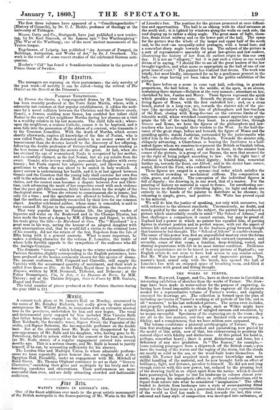hutment THEATRICALB.
La Tireuse des Cartes, a long-expected drama by M. Victor Sejour, has been recently produced at the Porte Saint Martin, where, with a solemnity not common at that popular establishment, it edifies the audi- ence by a novel collision between the Christian and the Hebrew creeds. Gemee, a Jewess, residing near Genoa, has confided her infant child Noemi to the care of her neighbour Martha during her absence on a visit to a wealthy relative in his last moments. The child falls sick; where- upon the neighbour, a zealous Catholic' causes it to be baptized, and it soon falls into the possession of the abbess of a convent, who transmits it to the Countess Lomellini. With the death of Martha, which occurs shortly afterwards, expires all knowledge of the fate of Noemi, who is now called Paula; but the distracted mother is no sooner aware of her bereavement than she devotes herself to the discovery of her offspring, following the double profession of fortune-telling and money-lending as the best means of learning the secrets of the great. At last, when she has attained the age of womanhood, Paula is recognized by her mother, and successfully claimed, as the lost Noemi, but no joy results from the event. Gemee, who is very wealthy, surrounds her daughter with every luxury ; but Paula regrets her adoptive parent, and likewise a young gentleman to whom she was about to be united in holy wedlock. A secret sorrow is undermining her health, and it is at last agreed between Gemee and the Countess that the young lady shall exercise her own free will in the selection of a mother. Both the contending parties urge their claims, and the contest soon becomes a dispute between Jew and Chris- tian, each advancing the merit of her respective creed with such violence that the poor girl falls senseless, fairly beaten down by the weight of the theological storm. When she returns to consciousness she is insane but only for a time ; and the spectators are allowed to believe, if they Ile, that the mothers are ultimately reconciled by their love for one common object. Another celebrated author, whose name is concealed, is said to have assisted M. Sejour in the composition of this drama. That very popular figure in Parisian life, the jingling vendor of liquorice and water on the Boulevard and in the Champs Elysees has been made the hero of a drama by MM. d'artery and Dugue, to Which his trade gives the title—Le Marchand de Coco. The "Marchand" is a great man in his way, saving the honour of an adopted daughter with such unscrupulous zeal, that he would fall a victim to the criminal laws of his country, did not the return of the first Napoleon from the Isle of Elba bring with it a general amnesty. What is more important, he makes a striking character for the veteran F. Lemaitre, the tinkle of whose bells forcibly appeals to the sympathies of the au.dience who fill the Ambigu-Comique. The dramatic "revues" which belong to the winter solemnities of the Parisian theatries, slightly corresponding to the English patomimes, have been produced at the houses commonly chosen for this species of drama. The ancient craftsmen, MM. Coignard and Clairville, still supply the Varietes with the accustomed quantity of merriment, and their work is called Sans Queue on Me. At the Palais Royal there is the Otnelette du Niagara, written by MM. Dormeuil, Thiboust, and Delacour ; at the Folies Dramatiques, Vfn, la Joie, et lee Pommes de Terre, by MM. Thierry ; and at the Theatre Dejuget, Care lti d'sous by MM. Guenee, Hugot and Percille.
The total number of pieces produced at the Parisian theatres during the year 1859 is 211.


























 Previous page
Previous page